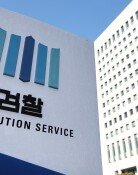Two-track Diplomacy toward Japan
Two-track Diplomacy toward Japan
Posted October. 26, 2005 07:33,
Japanese Prime Minister Junichiro Koizumis recent visit to Yasukuni Shrine has further strained Korea-Japan relations, leading to expectations that the bilateral relationship will take the path of selective differentiation, in which the quantity and quality of exchanges carried out will differ for each sector.
At a high-level strategic meeting on October 21, President Roh Moo-hyun and the ministers in charge of foreign affairs and security confirmed the two-track diplomacy as a basic framework for the relationship between the two countries, which gave rise to such forecasts.
According to this policy, exchanges will continue in areas essential for basic friendship or national interest but desist in those not mandatory. The framework also includes the principle of adopting an attitude hostile within a possible extent toward those Japanese politicians and ministers who visit the offending shrine.
This is why the government has on one hand decided for Foreign Affairs and Trade Minister Ban Ki-moon to visit Japan from October 27-29 and has left open the possibility of Korea-Japan summit talks during the APEC Summit Meetings held next month in Busan, but on the other hand is taking a negative position on holding the bilateral summit talks in Japan scheduled for December.
To mention the areas where cooperation and exchanges between Korea and Japan are vital, dialogue on the six-party talks to resolve the North Korean nuclear issue would come before any other. Cultural and economic exchanges on the private level bearing a close correlation to Koreas national interest are also likely to continue robustly. As a result, the 2005 Korea-Japan Friendship Year events are predicted to take place as had been originally planned.
Visa exemption agreements, improving the legal status of ethnic Koreans living in Japan, and dialogue in multilateral conference groups, among others, also count as essential measures.
However, the government seems unlikely to invite conservative Japanese politicians to various events or hold meetings on a high-ranking level in the case they do visit.
Setting up sisterhood ties on an upper or lower local government level or parliamentarian diplomacy on the part of the national assembly may take place independent of the central government policies, but relations will most likely cool anyhow. When controversy arose over Japans claim to Dokdo and the textbooks incorrectly depicting history, a large number of exchanges between provincial cities of the two countries were cancelled.
Jong-Koo Yoon jkmas@donga.com



![“한동훈, 정치생명 걸고 무소속 출마해 평가받는 것 고려할만”[정치를 부탁해]](https://dimg.donga.com/c/138/175/90/1/wps/NEWS/IMAGE/2026/01/19/133186982.1.jpg)


![[한규섭 칼럼]왜 여당 지지율은 떨어지지 않는가](https://dimg.donga.com/c/138/175/90/1/wps/NEWS/IMAGE/2026/01/19/133189257.1.png)
